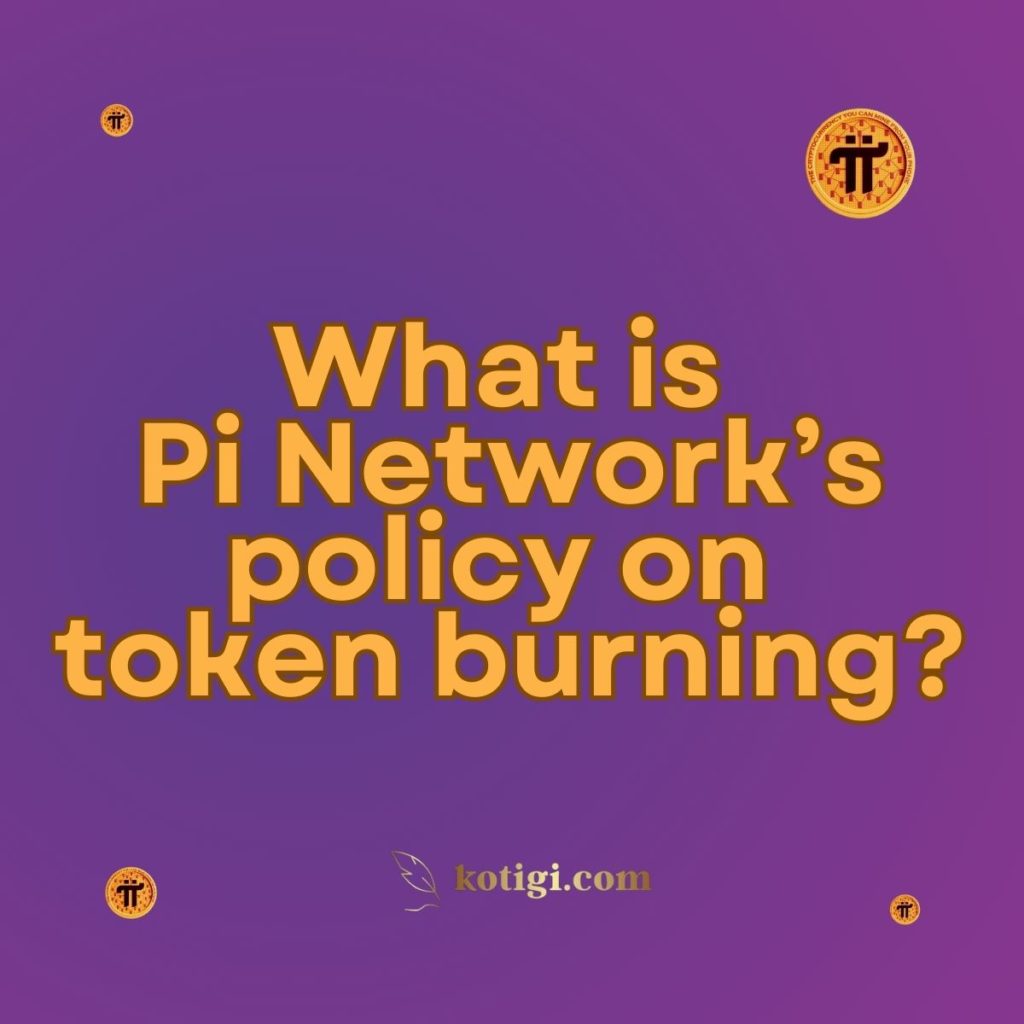
What is the Pi Network’s policy on token burning?
Pi Network’s policy ensures that there will always be 100 billion Pi tokens in circulation. Instead of permanently burning tokens, Pi Network reclaims inactive or non-compliant accounts, returning their tokens to a reserve pool for future uses, such as rewards, prizes, and network fees.
Introduction
Pi Network takes a unique approach to managing token supply, prioritizing sustainability without using traditional burning methods. While token burning often refers to the permanent destruction of tokens to create scarcity, Pi Network instead reclaims tokens from inactive or non-compliant accounts, redistributing them to support the ecosystem. This ensures the total supply of Pi remains fixed at 100 billion tokens, maintaining the network’s integrity.
This post explores how Pi Network manages account expiration, KYC compliance, and lost wallet passphrases while maintaining a constant token supply. It also examines how reclaimed tokens will be utilized to benefit the ecosystem, including prizes and operational needs.
Fixed Supply: 100 Billion Pi Tokens
No Permanent Token Burning
Unlike many blockchains, Pi Network does not destroy tokens through permanent burning. Instead, it emphasizes maintaining a stable supply of 100 billion Pi, with any reclaimed tokens being repurposed for future initiatives.
Pooling Reclaimed Tokens
When accounts expire or fail to meet KYC (Know Your Customer) requirements, their tokens are returned to a reserve pool. These tokens are not added back to the mining pool but are used strategically for various purposes, such as ecosystem development, transaction fees, and hackathon rewards.
Impact of Lost Wallets on Supply
Some tokens will inevitably remain inaccessible on the blockchain due to lost wallet passphrases. Although these tokens remain part of the total supply, they are effectively removed from circulation, contributing to scarcity without intentional burning.
Managing Pre-Mainnet Accounts and KYC Compliance
Expiry of Pre-Mainnet Accounts
All Pi accounts created before the Mainnet launch are subject to expiration if they fail to complete the KYC process. The Core Team has set a six-month deadline for these accounts to pass KYC, ensuring that only verified users participate in the Mainnet economy.
Reclamation of Inactive Accounts
If a pre-Mainnet account does not meet the KYC requirements within the stipulated time, the tokens held in that account will be reclaimed and returned to the reserve pool. This ensures that unverified accounts do not inflate the active token supply.
Role of KYC in Network Integrity
The KYC process is crucial to Pi Network’s commitment to compliance and security. By ensuring that only verified accounts participate in the Mainnet, the network reduces the risk of misuse and strengthens the legitimacy of its user base.
Handling Lost Wallets and Inaccessible Tokens
Tokens Locked in Inaccessible Wallets
Due to the non-custodial nature of Pi wallets, losing the passphrase makes it impossible to access the tokens stored within them. These tokens remain on the blockchain but are effectively removed from active circulation.
Effect on Network Economics
While inaccessible tokens contribute to scarcity, they are not intentionally burned. This helps maintain the balance between supply and demand without altering the fixed total supply of 100 billion Pi tokens.
Promoting Security Awareness
To mitigate the impact of lost wallets, Pi Network emphasizes the importance of securely storing wallet passphrases. Community education and awareness are key to preventing token loss.
Reclaimed Tokens and Ecosystem Development
Strategic Use of Reclaimed Tokens
The tokens reclaimed from expired or non-compliant accounts are allocated to a reserve pool for specific ecosystem needs. These tokens may be used for transaction fees, community prizes, hackathon rewards, or other operational purposes.
Supporting Hackathons and Development Initiatives
Pi Network organizes hackathons and other community-driven events to foster innovation. Reclaimed tokens will play a vital role in rewarding developers and participants, promoting continuous ecosystem growth.
Long-Term Sustainability through Redistribution
Rather than burning tokens, Pi Network’s policy ensures that reclaimed tokens are reintegrated into the network strategically. This approach promotes long-term sustainability and strengthens the ecosystem.
Governance and Future Adjustments
Role of Community Governance
Pi Network’s governance model empowers the community to influence key decisions, including those related to token supply management. Any changes to token policies, including potential burning mechanisms, would require community consensus.
Maintaining Transparency and Trust
The Core Team emphasizes transparency in managing reclaimed tokens to maintain trust within the network. Clear communication about how these tokens are used ensures alignment with the community’s expectations.
Flexibility for Future Needs
While token burning is not part of the current policy, the network remains open to future adjustments based on community input and evolving economic conditions. Governance mechanisms will allow the community to adapt policies as needed.
Conclusion
Pi Network’s token supply strategy is designed to maintain stability and support long-term ecosystem growth without relying on permanent burning. With a fixed supply of 100 billion Pi tokens, the network focuses on reclaiming tokens from expired or non-compliant accounts and repurposing them for development initiatives. This ensures that every token serves a meaningful purpose in strengthening the network.
By encouraging user participation and responsible wallet management, Pi Network creates a sustainable and inclusive environment. Community governance will continue to play a critical role in shaping the future of the network’s economic policies, ensuring that decisions align with both user needs and the project’s vision.
Key Takeaways
- Fixed Supply of 100 Billion Tokens: Pi Network maintains a constant token supply without burning tokens permanently.
- Reclaimed Tokens for Development: Tokens from expired or unverified accounts are returned to a reserve pool for future use.
- No Mining Pool Redistribution: Reclaimed tokens are not returned to the mining pool but are allocated for fees, rewards, and events.
- Impact of Lost Wallets: Inaccessible tokens contribute to scarcity without intentional burning.
- Importance of KYC Compliance: Pre-Mainnet accounts must pass KYC within six months, or their tokens will be reclaimed.
- Community Governance and Transparency: Future token policies, including burning decisions, will require community consensus.
- Support for Hackathons and Prizes: Reclaimed tokens will be used to incentivize development and community participation.





